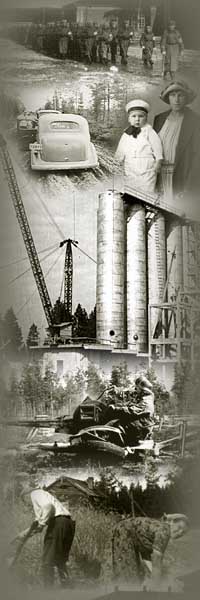 |
 |
|
|
Studia
Historica Septentrionalia 45
|
|
|
Kari
Alenius, Olavi K. Fält, Jouko Vahtola (Toim.),
Vieraat sotilaat.
Seminaari Oulun
yliopistossa 5.2.–6.2.2004.
Pohjois-Suomen Historiallinen Yhdistys, Rovaniemi 2004. 276 pages
|
 |
Summary:
Marianne Junila, The Presence of a Foreign Military Force in
the Northern Finnish Community
During World War II the civil populations of many countries came into
contact with foreign soldiers. The foreign military was present either
in the role of an ally (for example in the U.K. and in Finland), or as
an occupying force (in Iceland and Denmark). The way the civil
population regarded the foreign forces was not only dependent on the
kind of position and power that was held by the soldiers, but it was
also influenced by the way this power was used. Within the limits set
by the position and power of the foreign forces, the civil population
chose between collaboration and resistance.
According to Werner Rings, forms of collaboration and resistance can
be categorised in the following way:
Resistance
Offensive
Defensive
Polemic
Symbolic
Collaboration
Neutral
Conditional
Tactical
Unconditional
In my article I examine the way the
people in Northern Finland related to the foreign forces. I also
compare the attitudes and behaviour of the Northern Finnish civilians
to situations in other European countries.
All forms of resistance occurred in Northern Finland. Offensive,
defensive, symbolic and polemic actions were taken even though the
resistance as a whole was unorganised and sporadic. Moreover,
civilians sought non-political and non-ideological co-operation with
the soldiers when this was beneficial to them. For example, trading
with the Germans or finding employment in the military’s service could
prove to be very profitable. This neutral collaboration was part of
the civilian population’s effort to adjust to the unusual and
unavoidable circumstances. This was the most commonly found attitude
towards foreign soldiers in Finland as well as in other European
countries.
The Finnish people had great confidence in the power of law and order,
which brought them a strong sense of security. Despite the fact that
the German soldiers were representatives of a foreign military force,
the civilians did not feel their sovereignty threatened by them.
Therefore the position of the Germans as foreign soldiers did not, in
the first instance, determine they way they were regarded by the
Finnish civilians.
Takaisin Studia Historica
Septentrionalia 45
|
 |